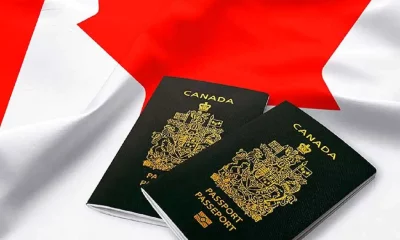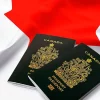Career
Ways to Travel to the UK as an Immigrant
The United Kingdom (UK) has long been a popular destination for immigrants from around the world, attracted by its vibrant culture, strong economy, and diverse opportunities. However, the process of immigrating to the UK can be complex, involving various visa categories, each with its own set of requirements. This article provides a comprehensive guide to the different ways to travel to the UK as an immigrant, ensuring clarity and accessibility for prospective migrants.
1. Work Visas
Work visas are one of the most common routes for immigrants. The UK offers several types of work visas depending on your qualifications, job offer, and field of expertise.
a. Skilled Worker Visa
The Skilled Worker Visa has replaced the Tier 2 (General) Visa. To qualify, you need a job offer from a UK employer who holds a valid sponsorship license. The job must meet a minimum skill level and salary threshold. This visa is suitable for professionals in various sectors, including healthcare, IT, and engineering.
b. Health and Care Worker Visa
A subset of the Skilled Worker Visa, this is designed specifically for healthcare professionals. It allows doctors, nurses, and allied health professionals to work in the UK’s National Health Service (NHS) or for an NHS supplier. Applicants benefit from reduced visa fees and faster processing times.
c. Global Talent Visa
For highly skilled individuals in fields such as science, engineering, humanities, medicine, digital technology, and the arts, the Global Talent Visa offers a pathway to the UK without requiring a job offer. Applicants must be endorsed by a recognized UK body, demonstrating they are leaders or potential leaders in their field.
2. Study Visas
For those looking to further their education, the UK boasts some of the world’s top universities and colleges.
a. Student Visa
The Student Visa is for individuals aged 16 and over who have been accepted onto a course at a UK educational institution. Applicants must demonstrate they have sufficient funds to support themselves and pay for their course. This visa allows for part-time work during term time and full-time work during holidays.
b. Child Student Visa
For younger students aged between 4 and 17 who wish to study at an independent school in the UK, the Child Student Visa is the appropriate route. Like the Student Visa, applicants must have a place at a school and adequate financial support.
3. Family Sponsorship
Family visas enable individuals to join family members who are already in the UK.
a. Spouse or Partner Visa
This visa is for those who are married to, in a civil partnership with, or in a long-term relationship with a British citizen or someone with settled status in the UK. Applicants must prove the genuineness of their relationship, meet English language requirements, and have sufficient financial means.
b. Parent Visa
Parents of children who are British citizens or have settled status can apply for this visa. The applicant must have sole or shared parental responsibility and demonstrate they can adequately support and accommodate themselves and their child.
c. Child Visa
Children under 18 whose parents are in the UK can apply to join them. This visa requires proof of the parent’s status in the UK and the ability to provide financially and emotionally for the child.
4. Business and Investment Visas
The UK encourages investment and entrepreneurial activity through various visa schemes.
a. Innovator Visa
Aimed at experienced businesspeople, the Innovator Visa requires a minimum investment of £50,000 in an innovative, viable, and scalable business idea that is endorsed by an approved body. Innovators must play a key role in the day-to-day management of the business.
b. Start-up Visa
The Start-up Visa is for those looking to establish a business in the UK for the first time. While there is no minimum investment requirement, applicants must be endorsed by an approved body and have an innovative business idea. This visa is particularly popular among young entrepreneurs and graduates.
c. Investor Visa
For high-net-worth individuals, the Investor Visa offers a route to residency through substantial financial investment in the UK. Applicants must invest at least £2 million in UK government bonds, share capital, or loan capital in active and trading UK-registered companies.
5. Asylum and Refugee Status
Individuals fleeing persecution or conflict may seek asylum in the UK. The asylum process involves proving that returning to their home country would put them at risk of serious harm due to race, religion, nationality, political opinion, or membership in a particular social group.
No, there are more than five ways to immigrate to the UK. The list provided covers some of the main routes, but additional pathways exist. Let’s expand on other significant routes and special programs that cater to specific circumstances:
6. Temporary Work Visas
Temporary work visas are for those who wish to work in the UK for a limited period, often in specific sectors.
a. Temporary Worker – Charity Worker Visa (Tier 5)
For those intending to undertake unpaid voluntary work for a charity. The sponsoring organization must be a licensed sponsor.
b. Temporary Worker – Creative and Sporting Visa (Tier 5)
This visa is for individuals in creative fields such as actors, dancers, or musicians, as well as sportspeople coming to the UK for short-term work.
c. Temporary Worker – Government Authorized Exchange Visa (Tier 5)
For those coming to the UK for a short-term placement through an approved government exchange scheme, which often includes internships, training programs, and research projects.
d. Temporary Worker – International Agreement Visa (Tier 5)
For individuals coming to the UK under international law, such as employees of overseas governments or international organizations, and private servants in diplomatic households.
e. Youth Mobility Scheme Visa (Tier 5)
Allows young people aged 18-30 from participating countries to live and work in the UK for up to two years. It is popular among citizens of countries like Australia, Canada, Japan, and New Zealand.
7. Settlement Visas
Settlement visas (Indefinite Leave to Remain – ILR) are for those who have been in the UK for a qualifying period and wish to make the UK their permanent home.
a. Long Residence
Individuals who have legally lived in the UK for 10 continuous years can apply for ILR. This route includes time spent on various visas.
b. Returning Resident Visa
For those who previously had ILR or were settled in the UK and are returning after an absence of more than two years. Applicants must demonstrate strong ties to the UK and intentions to make it their permanent home.
8. Special Categories
There are special categories catering to unique situations.
a. Ancestry Visa
For Commonwealth citizens with a grandparent born in the UK, the Channel Islands, or the Isle of Man. This visa allows applicants to live and work in the UK for up to five years, with a pathway to settlement.
b. British National (Overseas) Visa
For individuals from Hong Kong holding British National (Overseas) status. This visa allows them and their family members to live, work, and study in the UK.
c. Domestic Workers in a Private Household Visa
For domestic workers accompanying their employer to the UK. The visa is valid for up to six months, provided the worker has been employed by the employer for at least one year.
d. Representative of an Overseas Business Visa
For employees of overseas businesses intending to establish a UK branch or subsidiary. This visa also applies to sole representatives of overseas media organizations.
9. Human Rights and Compassionate Grounds
In exceptional cases, individuals can apply to remain in the UK based on human rights or compassionate grounds.
a. Human Rights Application
Applicants can argue that their removal from the UK would breach their human rights, particularly the right to family and private life under Article 8 of the European Convention on Human Rights.
b. Discretionary Leave
Granted to those whose circumstances fall outside the standard immigration rules but have compelling reasons to stay in the UK, such as severe health issues or other compassionate factors.
Conclusion
The UK offers a diverse range of immigration routes to cater to various needs and circumstances. From work and study opportunities to family reunification, business ventures, and compassionate cases, understanding these pathways is crucial for anyone considering making the UK their home. It’s advisable to consult the UK government’s official immigration website or seek professional legal advice. This will help navigate the application process’s complexities and ensure a successful immigration journey.
Immigrating to the UK can be a transformative experience, offering new opportunities and a chance to build a future in one of the world’s most dynamic countries.















